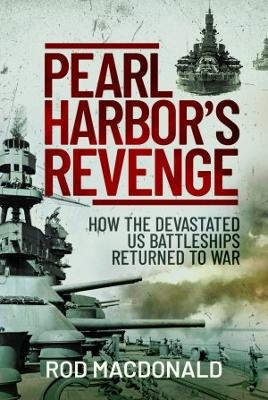
Pearl Harbor's Revenge
Frontline Books (Verlag)
978-1-3990-1329-1 (ISBN)
Early on Sunday, 7 December 1941, Japanese carrier-borne aircraft launched a surprise attack against the US Pacific Fleet based at Pearl Harbor. It was a date that President Roosevelt declared will live in infamy .
During the strike, Japanese planes attacked the seven US battleships lined up in Battleship Row - and the flag battleship USS Pennsylvania, in drydock for overhaul. The battleship USS Arizona exploded from a bomb hit at the forward magazine killing 1,177 officers and men. On USS Oklahoma, 429 men were killed - many trapped inside as the great battleship capsized after aerial torpedo strikes. USS West Virginia, meanwhile, was hit by at least seven torpedoes and several bombs, and engulfed in flames; she settled onto the bottom on an even keel. USS California was hit by a pair of torpedoes and a bomb, flooding slowly, she too settled on the bottom. The other four battleships present were more lightly damaged, with the crippled Nevada, the only battleship to get underway during the attack, being successfully beached.
By the time the assault was over, eight battleships, three light cruisers, three destroyers, a training ship and other smaller vessels had been sunk or damaged. Hundreds of US aircraft had been damaged or destroyed, whilst 2,403 Americans had been killed.
Within a week of the Japanese attack, a great salvage organisation had been formed. Very quickly the lightly damaged battleships Pennsylvania, Maryland and Tennessee had been repaired in naval yards and put back into service to protect the west coast of the USA.
Of the eight battleships attacked, all but Arizona were raised, temporarily patched-up and sent back to naval yards on the west coast of America for final repair and modernisation. Main battery guns and ordnance were recovered from the wrecked Arizona, which would then be left to rest on the bottom of the harbour for eternity - as a memorial to the events of that fateful December day. USS Nevada was lifted off the bottom in February 1942, California in March 1942 and West Virginia in June 1942. The capsized Oklahoma, whilst eventually parbuckled and raised, was found to be too badly damaged to be fully rebuilt.
Six of the eight battleships would thus return to service, with improved protection against bombs and torpedoes and being fitted with the latest anti-aircraft and gunnery systems. They would re-enter to the war to wreak a terrible revenge - making their presence felt during the reconquest of the Aleutian Islands and the Philippines, and the great battles of Leyte Gulf, Iwo Jima and Okinawa. Nevada would go on Atlantic convoy duty before bombarding German positions off Utah beach as the D-Day Normandy landings began. This is the story of those six.
ROD MACDONALD is an internationally renowned shipwreck explorer, undersea adventurer and best-selling diving author with eleven books about shipwrecks, the culmination of a lifetime of diving. His beautifully illustrated books are the internationally accepted definitive guides to many world-famous dive locations such as Scapa Flow and Truk Lagoon. Rod is a graduate of the University of Aberdeen School of Law. He is a Fellow of the Explorers Club of New York and a Patron of the GB & Ireland Chapter of the Explorers Club. When not writing or exploring shipwrecks he is a big boat yachtsman, former volunteer lifeboatman, a RYA Advanced Powerboat Instructor and a Search and Rescue (SAR) instructor. He lives in Stonehaven, a small fishing town on the north east coast of Scotland with his wife, his two children having flown the coup.
| Erscheinungsdatum | 14.04.2023 |
|---|---|
| Zusatzinfo | 64 black and white illustrations |
| Verlagsort | Barnsley |
| Sprache | englisch |
| Maße | 156 x 234 mm |
| Themenwelt | Geschichte ► Allgemeine Geschichte ► 1918 bis 1945 |
| Geschichte ► Teilgebiete der Geschichte ► Militärgeschichte | |
| Sozialwissenschaften ► Politik / Verwaltung | |
| ISBN-10 | 1-3990-1329-7 / 1399013297 |
| ISBN-13 | 978-1-3990-1329-1 / 9781399013291 |
| Zustand | Neuware |
| Informationen gemäß Produktsicherheitsverordnung (GPSR) | |
| Haben Sie eine Frage zum Produkt? |
aus dem Bereich


